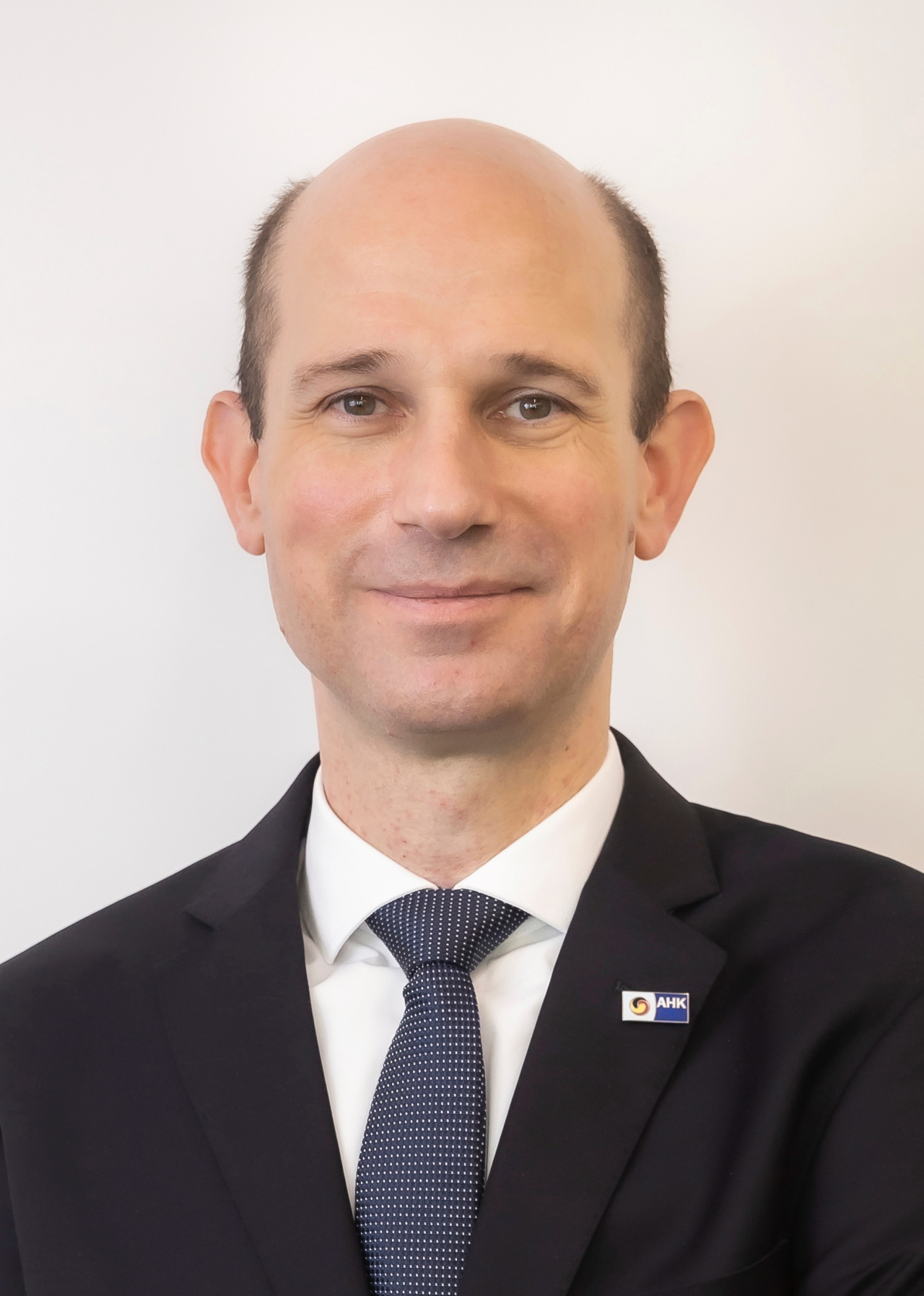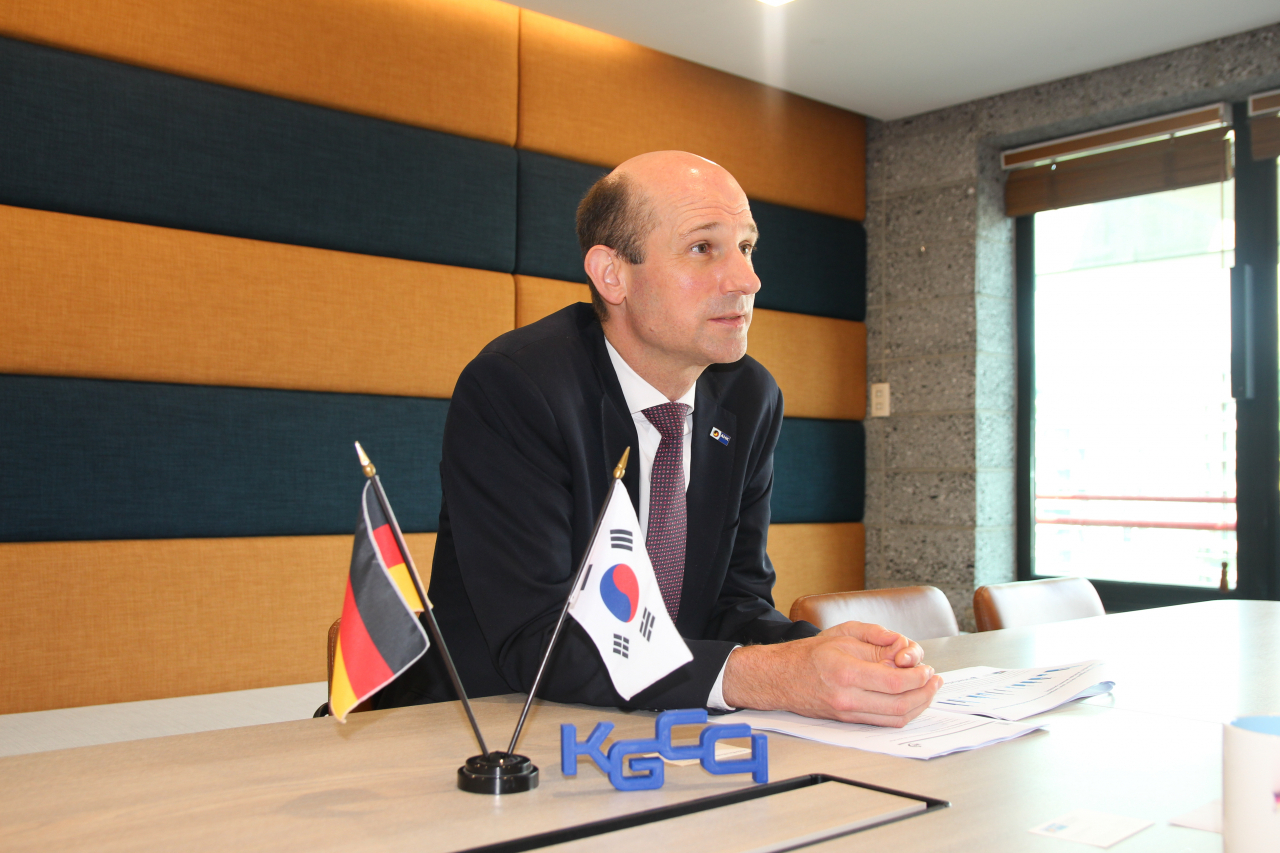[Herald Interview] Korea-Germany partnership crucial for sustainable future: KGCCI chief
By Sanjay KumarPublished : June 20, 2023 - 14:49

The Germany-Korea partnership holds potential for significant progress in renewable energy development and a greener, more sustainable future, said Korean-German Chamber of Commerce and Industry (KGCCI) President Martin Henkelmann in an interview with The Korea Herald on Monday.
Referring to the goals pledged by Germany and Korea to become carbon neutral by 2045 and 2050, respectively, Henkelmann said those net-zero emissions goals are pushing companies to increase corporate efforts in decarbonization driven by consumer and client demands.
According to Henkelmann, Germany and Korea have a mutual interest in renewable energy and the energy transition due to the carbon dioxide emissions associated with industrial production and the efficient utilization of produced energy.
“We are always for green energy,” he stressed, urging both the private and public sectors of Germany and Korea to prioritize renewable energy solutions such as wind and offshore wind energy, as well as green hydrogen production for energy efficiency.
“Urgent climate action is essential," he said.
The climate crisis is why Germany and Korea are intensifying renewable energy sector cooperation to tackle the challenges of climate change, said Henkelmann citing the recent discussions about expanding renewable energy facilities and comprehensive transition to renewable energy held at the Korean-German Energy Day conference in Busan on May 26.
The German-Korean Business and Investment Summit to be held in Frankfurt June 28-29 will address carbon neutrality and renewable energy solutions and share experiences to decarbonize German and Korean industries.
Henkelmann is set to attend the summit as a panelist where he will discuss the role of governments in financing renewable energy infrastructure and whether big industry companies should produce their own renewable energy or purchase it from the market.
According to Henkelmann, excess heat generated during the production of goods can be harnessed for steam generation. Addressing these kinds of problems requires Germany and Korea to share experience and knowledge.
Building wind turbines, for instance, involves navigating complex procedures, ensuring construction and planning rights, and connecting numerous wind turbines to a single grid, said Henkelmann.

"Legal certainty and transparent procedures are crucial for attracting investors,” he said.
Recent bills in the German parliament, particularly those concerning the expansion of offshore wind power, aim to address these issues effectively.
However, Henkelmann stressed the urgent need to build infrastructure for the energy transition.
He said that Germany is facing higher energy prices compared to Korea and grappling with bureaucratic and technical complexities associated with transitioning to renewable energy sources.
Henkelmann suggested overcoming obstacles through smart grids and intelligent energy management systems, clear legal frameworks, transparent procedures and public acceptance to attract investment and ensure the effective allocation of funds for a successful energy transition.
“We have to think about all the NIMBY -- not in my backyard -- people, that exist here in Korea as well as in Germany,” he said.
Discussing the milestones achieved over 140 years of German-Korean economic diplomacy, Henkelmann traced the origins of the partnership back to the unification of Germany in 1871, a pivotal moment when Germany sought to expand business interests and establish trade routes.
In 1883, Germany and Korea signed a treaty and by 1884, the first German company was already doing business and looking for business opportunities in Korea.
“It was the first German company in Korea, a branch of H. C. Eduard Meyer & Co., in 1884,” he recalled.
The treaty became an integral part of economic outreach, solidifying the bridge between the two nations.
Henkelmann, however, commented that after the beginning of Japanese colonial rule on the Korean Peninsula, Germany and Korea faced limited interaction on the economic front.
But after World War II, Germany and Korea rekindled cooperation, both at the end of the Korean War, when West Germany sent medical support to South Korea, as well as afterwards.
"Korea’s importance grew," he said.
In 1990, Germany and Korea had a trading volume consisting of $5 billion coming into Korea from German exports and $4 billion going from Korea to Germany, Henkelmann highlighted.
"Now Korea stands out as a crucial export market and a major player in Asia's trade volume for Germany," said Henkelmann.
“The bilateral trade volume reached an all-time high of $33.68 billion in 2022. Investment from Germany to Korea is an accumulated $13.7 billion (1964-2022), while Korean investment in Germany amounted to $3.6 billion (2015-2022),” according to Henkelmann.
Henkelmann, however, noted that the cited trade volume figures do not fully capture the comprehensive scope of economic activity between Germany and Korea because many Korean products are manufactured outside of Korea and vice-versa.
Shared challenges and mutual interests shape the German-Korea partnership because both countries heavily rely on exports and prioritize maintaining a rule-based international order for trade as well as fair competition for their companies, he said.
Underscoring the role of German-Korean cooperation amid growing interest in the Indo-Pacific region, Henkelmann said that Germany has already issued its Indo-Pacific guidelines and has around 20 offices and chambers in the Asia-Pacific region.
“The Indo-Pacific is an important market for Germany,” Henkelmann stressed.
“Germany looks highly on value-driven partners,” he said referring to countries with democratic norms, the rule of law and human rights, such as Korea and Japan, as key partners for Germany.
The visit of German frigate, the Bayern, to Korea is a demonstration of Germany's commitment to the Indo-Pacific and the region holds significance due to its volume of world trade, transportation and supply chain activities, according to Henkelmann.
He added that Germany aims to strengthen its economic diplomacy and policies in the Indo-Pacific region, which is also welcomed by German companies.



















